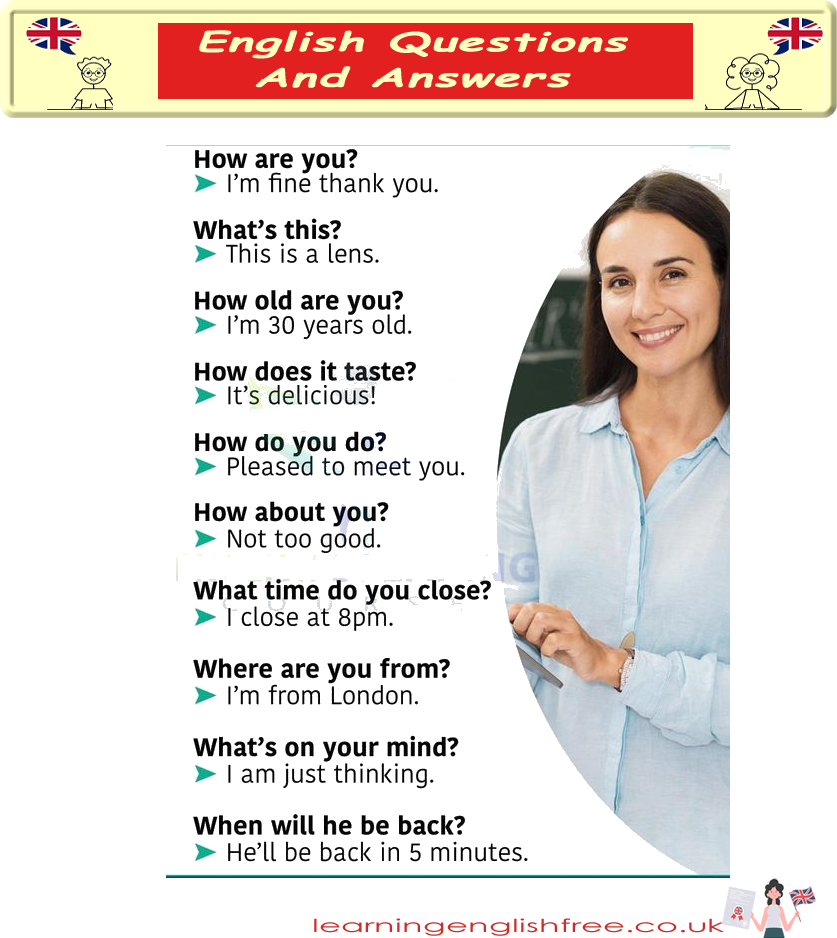
Unlocking Everyday English: Questions and Answers for ESL Learners
Engaging in everyday conversations in English involves a dance of questions and answers, a fundamental skill for ESL students aiming to navigate social interactions smoothly. This lesson delves into the art of asking and responding to common English questions, offering learners insights into not just the "what" but the "how" of conversation. By mastering these exchanges, students will find themselves better equipped to participate in discussions, form connections, and express themselves with confidence.
Useful Vocabulary for English Questions and Answers
-
How are you?
- A greeting inquiring about someone's well-being.
- Response: "I'm fine, thank you."
- Meaning: A polite way to express that you are doing well.
-
What's this?
- A question asking for the identification of an object.
- Response: "This is a lens."
- Meaning: Identifying an object as a lens.
-
How old are you?
- Inquiring about someone's age.
- Response: "I'm 30 years old."
- Meaning: Stating one's age as thirty.
-
How does it taste?
- Asking for an opinion on the taste of something.
- Response: "It's delicious!"
- Meaning: Expressing that something tastes very good.
-
How do you do?
- A formal greeting, not actually inquiring about one's health.
- Response: "Pleased to meet you."
- Meaning: A polite expression used when meeting someone for the first time.
-
How about you?
- Inquiring back about the original asker's state or opinion.
- Response: "Not too good."
- Meaning: Sharing that one is not doing well.
-
What time do you close?
- Asking about the closing time of a business.
- Response: "I close at 8 pm."
- Meaning: Informing that the business closes at 8 pm.
-
Where are you from?
- Inquiring about someone's place of origin.
- Response: "I'm from London."
- Meaning: Stating that one is from London.
-
What's on your mind?
- Asking about what someone is thinking.
- Response: "I am just thinking."
- Meaning: Sharing that one is pondering but not specifying the subject.
-
When will he be back?
- Inquiring about the return time of someone.
- Response: "He'll be back in 5 minutes."
- Meaning: Informing that the person will return shortly.
Summary and Takeaways
Mastering English questions and answers is a pivotal step towards fluency and confidence in everyday conversations. This lesson has covered key phrases that are essential for social interactions, providing a foundation upon which learners can build more complex dialogues.
To reinforce your learning:
- Practice these questions and answers with a partner or in a study group.
- Create flashcards to memorize the phrases and their responses.
- Record yourself asking and answering these questions to improve pronunciation.
Remember, language learning is a journey of continuous practice and exposure. Engage in conversations, be curious, and don't be afraid to make mistakes.
For more lessons and tips, visit our Facebook page Learning English Free. Share your progress and discover a community of learners eager to support each other.
